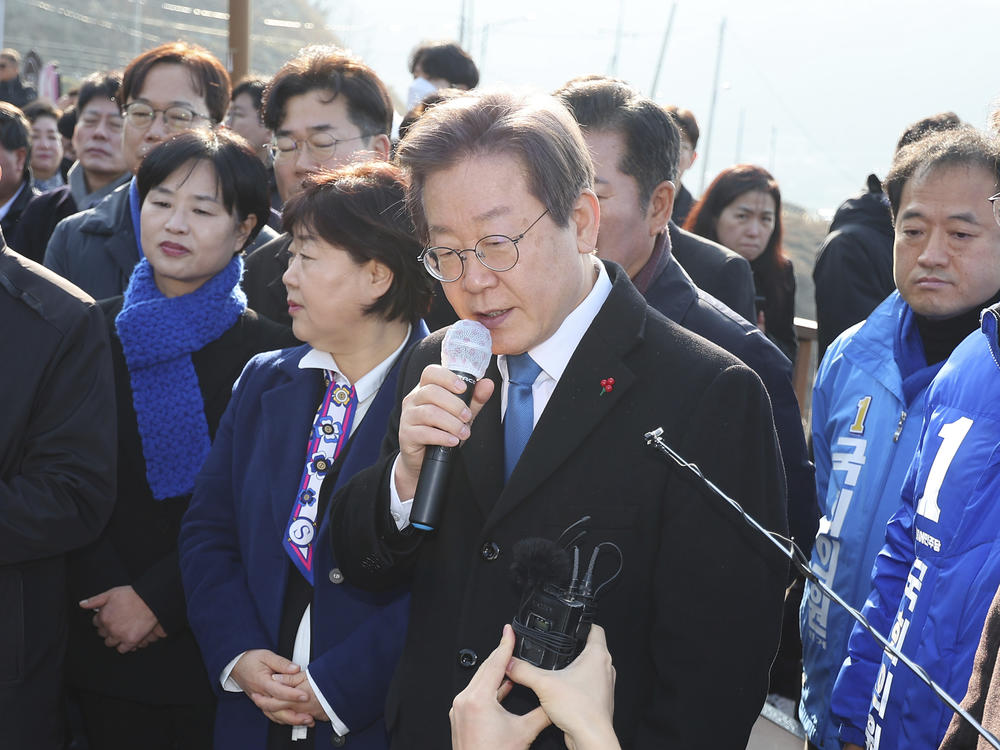Section Branding
Header Content
South Korean opposition leader is stabbed by knife-wielding man
Primary Content
SEOUL, South Korea – South Korean opposition leader Lee Jae-myung was stabbed in the neck during a visit in the southeast city of Busan on Tuesday, police said, as few details about the motive for the attack were immediately available.
Lee, the chairperson of the main opposition Democratic Party, was leaving an event on Gadeok island, when an unidentified man pressed through a packed crowd of reporters and supporters and attacked him on the left side of his neck, according to a livestream video of the incident.
Lee, who was seen collapsing on the ground and bleeding in pictures by local media, was taken to the Pusan National University Hospital.
In a press conference outside the hospital, Democratic Party spokesperson Rep. Kwon Chil-seung said that medical professionals "suspect injury to his jugular vein" and "are concerned about additional loss of blood." Kwon said Lee will be transported to Seoul for surgery.
Kwon called the attack "an act of terrorism against Lee Jae-myung and a serious threat to democracy."
The attacker apparently posed as a supporter of Lee's, the livestream footage shows, wearing a headpiece with a supportive message toward Lee. He was arrested on the scene and is being investigated by the police.
The attack comes just three months before South Korea's general elections, a high-stakes event for both the ruling conservative People Power Party and Lee's Democratic Party.
President Yoon Suk Yeol, who defeated Lee in the 2022 election with the paper-thin margin of 0.73% of the popular vote – the smallest in the country's history – has frequently clashed with the parliament, where the DP holds more than 56% of seats.
Yoon's approval ratings have remained at or below 35% through the past year. His party lost a crucial by-election in a Seoul ward last year, and the party's former chief Lee Jun-seok, who is widely credited for bringing young male voters to Yoon's support, recently left the party.
The DP and other opposition parties are pushing for a special probe on the suspected stock price manipulation scandal involving Yoon's wife.
Lee, meanwhile, has been under intensive investigations by the police and prosecutors for his suspected involvement in a land development scandal and other criminal charges.
Support for his party has been similar to or slightly below the approval ratings of the ruling party in recent months, as the DP struggled with a bribery scandal involving a former chief and a number of lawmakers.
Lee's visit in Busan on Tuesday – his first official schedule of the new year – is seen as an effort to woo support in the port city, which has traditionally been conservative-leaning.
Construction of a new airport, which was finalized during the liberal president Moon Jae-in's term, is planned to break ground next year on the island where Tuesday's attack took place.
President Yoon, according to his spokesperson Kim Soo-kyung, expressed deep concern over Lee's safety and said such acts of violence should never be tolerated.
South Korea has seen a number of attacks against high-profile politicians in recent years. In 2006, Park Geun-hye, the then head of a conservative party who later became the president, was attacked with a knife during a campaign event. Last year, Lee Jae-myung's predecessor Song Young-gil was attacked with a blunt weapon in Seoul.
In 2015, the then-U.S. ambassador to South Korea Mark Lippert was attacked on his face by an assailant wielding a knife.
Copyright 2024 NPR. To see more, visit https://www.npr.org.

